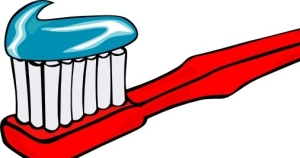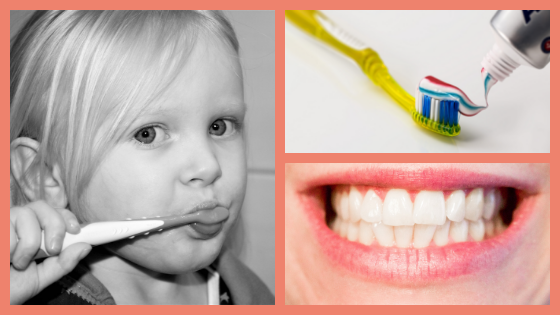Great dental health begins at home! The dental professionals at South Valley Pediatric Dentistry can help keep teeth healthy and strong with regular cleanings, check-ups and restorations such as fillings or crowns, but without daily at-home dental care, children are at risk for dental complications such as infection and cavities. Most of us know the golden rules of home dental care, – brush teeth at least twice a day and floss at least once a day – but many have questions about which of the variety of available products will work best for their child. These are the types of dental care tools we recommend for our patients:
Tooth paste: Children under four should use a fluoride-free toothpaste to prevent them from swallowing too much fluoride, which can cause permanent white spots to form on developing teeth. By the age of four most children can spit excess toothpaste out, which means they can switch to an adult toothpaste. However, some children dislike the stronger flavors of adult toothpaste. In that case, they can continue to use a children’s toothpaste, while supplementing with prescription fluoride drops or tablets.
 Tooth Brush: Choose a soft bristled toothbrush for yourself and your children. Brushes with firmer bristles are too abrasive and can damage enamel. Electric toothbrushes also work well, but can be expensive and are not required for good dental hygiene.
Tooth Brush: Choose a soft bristled toothbrush for yourself and your children. Brushes with firmer bristles are too abrasive and can damage enamel. Electric toothbrushes also work well, but can be expensive and are not required for good dental hygiene.
Floss: Cleaning between your child’s teeth is an important part of dental care. As soon as teeth begin to touch, you should begin flossing once a day with your child. Traditional waxed or unwaxed dental floss works well to clean between teeth and strengthen gums, but many parents find dental flossers such as these are easier for children because of the easily gripped handle. Other inter-dental cleaners such as water picks, proxy brushes or wooden toothpicks may be used as an alternative to dental floss.
Other inter-dental cleaners such as water picks, proxy brushes or wooden toothpicks may be used as an alternative to dental floss.
Fluoride Supplement: Your dentist may prescribe a fluoride supplement if you live in an area without fluoridated water, or if your children require additional fluoride due to genetic or other factors. Children younger than 6 months should not take a fluoride supplement. For children older than 6 months, your dentist can discuss what kind of supplement to use.
By incorporating the proper dental tools into your at-home dental care routine, you and your children can fight dental carries, gum disease, and infection – keeping your child’s smile healthy and beautiful.



Dental Hygiene For Everyone | South Valley Pediatric Dentistry
[…] ever wondered what kind of toothbrush, toothpaste, or floss will work best, read this article, Tools of the Trade. To learn about dental health in very little children check out Dental Care for Infants and […]
Brushing your Best and Still getting Cavities? Here's a Cavity Control Checklist - South Valley Pediatric Dentistry
[…] most common way most of us get topical fluoride is from toothpaste. It’s important to use a dentist recommended toothpaste with fluoride listed in the active ingredients. Many “holistic” or so-called […]
How to Help Kids Enjoy Dental Hygiene - South Valley Pediatric Dentistry
[…] ever wondered what kind of toothbrush, toothpaste, or floss will work best, read this article, Tools of the Trade. To learn about dental health in very little children check out Dental Care for Infants and […]
Crash Course in Cavity Treatment - South Valley Pediatric Dentistry
[…] dental hygiene at home is your first defense against cavities. Thoroughly brush your child’s teeth with a soft bristle brush twice a day. You don’t need to brush very hard to remove the food […]
Prepping for the first check-up: The three W's : South Valley Pediatric Dentistry
[…] –Tools: After your teeth are all clean, the Dentist counts your teeth using a metal mirror and some other special tools. While counting, the dentist will check each tooth and tell us if they all look good and strong. […]